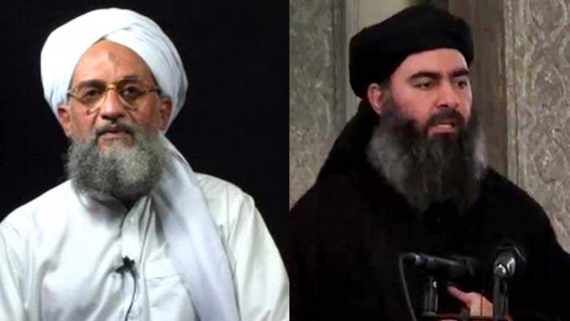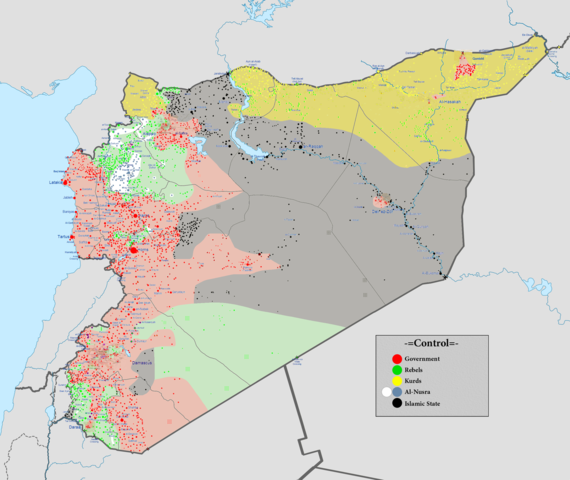On May 7, Ayman al-Zawahiri, the head of al-Qaeda, released an audio recording in which he announced that he had given his permission for the al-Qaeda affiliated Syrian jihadist group, al-Nusra Front, to create "a new emirate" in Syria. Currently, al-Nusra Front has militants scattered throughout western Syria and directly controls a region of approximately 2,000 square miles in Idlib Province.
This was not the first al-Qaeda linked emirate. Al-Qaeda in the Arabian Peninsula (AQAP) had declared an emirate in Yemen back in 2012. Al-Qaeda in the Islamic Maghreb (AQIM) announced the creation of the "Sahara Emirate" in 2010, although technically the emirate was created by a splinter group from al-Qaeda that later rejoined AQIM.
The proposed "Syrian Emirate" is, however, the first emirate in which al-Qaeda's senior leadership has taken the lead in organizing. As such, it represents a direct challenge to the Islamic State (IS) Caliphate announced by Abu Bakr al-Baghdadi in June 2014, further underscoring the increasingly bitter and oftentimes violent rivalry between the two organizations.
In the Islamic world an emirate is a political organization and the emir who governs it is a political leader. A caliphate is both a political and religious organization, and the caliph who governs it is simultaneously both a political and a religious leader. The caliph represents the highest political and religious authority within the Islamic world. Typically, in Islamic history, emirates have been subdivisions within a caliphate and emirs local leaders subordinate to the caliph.
Under Sharia law there can only be one caliphate and only one Amir al-Mu'minin--leader of the faithful. The last official caliphate ended in 1922 with the abolishment of the Ottoman Sultanate. The leader of Islamic State, Abu Bakr al-Baghdadi, declared the establishment of a new caliphate in June 2014, assuming for himself the title of caliph and "leader of the faithful."
Zawahiri's announcement stopped short of calling for the establishment of a rival caliphate. He did, however, lay the foundation for declaring a caliphate at a later date by characterizing the Islamic State as "Kharijites." The term is used by Salafists who agree with Islamic States' religious doctrines but disagree with the organization's political views and agenda.
The Kharijites were a radical sect in the early history of Islam that was noted for its extremist views on takfir, the excommunication and killing of Muslims considered insufficiently devout or accused of having abandoned Islam. The term Kharijite or neo-Kharijite is often used as a synonym for extremist Islamic views.
The announcement, although not wholly unprecedented, capped a sharp change from previous al-Qaeda policy, and has been in process since at least 2012. Bin-Laden had always opposed the creation of either an emirate or a caliphate in the Middle East until the United States was "defeated," in other words, until it either voluntarily withdrew from the Middle East, or was forcibly ejected, and its protection of the Western leaning Gulf monarchies was ended.
Bin Laden believed that the announcement of an emirate or caliphate prior to "defeating" America would result in the United States and its allies bringing overwhelming force against the new state and destroying it.
There are at least three reasons that explain the shift in strategy on the part of al-Qaeda and Zawahiri over the last several years.
First, it is clear that Islamic State has garnered a lot of prestige and influence in the jihadist world by proclaiming itself a caliphate. Since June 2014, IS has drawn over three dozen jihadist movements into its orbit and it has expanded its "geographic reach" to include 30 different provinces or wilayas.
In some cases, like the three Libyan wilayas (Cyrenaica, Tripolitania and Fezzan), Islamic State is heavily involved from an operational standpoint and has supplied fighters, arms and financial assistance. Others, like the Nigerian Boko Haram or the Philippine Abu Sayyaf, have adopted some of the imagery and sophisticated media techniques of Islamic State, but do not maintain any direct operational links with IS nor does it appear that they are subject to Baghdadi's direct control.
Of the 30 different wilayas organized by Islamic State, 20 are in Syria and Iraq, and 10 are outside of its core territory. Not all of the wilayas in Iraq and Syria, however, are under its control. Some like the wilaya of Baghdad or Damascus, it has proclaimed but never actually governed. Moreover, outside of the city of Sirte in Libya, all the cities it controls are in its core Syrian-Iraqi territory.
Many of Islamic State's affiliates and provinces outside of its core territory are simply existing jihadist organizations, or splinters of those organizations, that have attempted to leverage Islamic State's prestige by rebranding themselves as affiliates. The Wilaya al Sudan al Gharbi (West Africa Province) is simply a repackaged Boko Haram. The Wilaya Sinai was the Sinai branch of the Egyptian jihadist group Ansar Beit al-Maqdis (Supporters of Jerusalem) that broke away from the pro al-Qaeda parent organization and declared its allegiance to IS.
By declaring its own official "emirate", al-Qaeda is leveling the playing field and trying to win back for itself some of the legitimacy and jihadist credentials that Islamic State obtained by declaring itself a caliphate.
Disposition of forces in the Syrian civil war as of May 1, 2016
Secondly, it is also possible that al-Qaeda is anticipating the imminent destruction, or the severe curtailment, of Islamic State and is positioning itself to inherit the remains of IS. Many of the Islamic State's foreign affiliates are either splinter groups, which emerged from existing pro al-Qaeda organizations, or former al-Qaeda affiliates that turned away to join IS. By positioning itself to absorb any remnants of Islamic State, al-Qaeda is creating the means for reintegrating those pro-IS splinter groups back into their pro-al-Qaeda parent.
It's not entirely clear why Zawahiri chose al-Nusra Front as the vehicle for al-Qaeda's first official emirate. The al-Nusra Front leadership is openly loyal to Zawahiri. It shows far less independence, and historically has been more willing to follow Zawahiri's lead, than the powerful al-Qaeda affiliates like the North African based al-Qaeda in the Islamic Maghreb (AQIM) or the South Arabian based al-Qaeda in the Arabian Peninsula (AQAP). It may also reflect the fact that al-Nusra Front's close proximity to IS means it is more likely to inherit, or be able to seize control, of major urban centers currently controlled by Islamic State militants.
Finally, Zawahiri's announcement also probably signifies a reassessment of the threat that the US and its allies pose to the new emirate. Given how anemic the US response has been to the emergence of Islamic State, Zawahiri may have concluded that Bin Laden was mistaken in arguing that the US must first be "defeated" before an emirate or a caliphate could be established. He may now feel it is safe to declare al-Qaeda's first official emirate in the heart of the historic Middle East, even if the US continues to remain engaged in Middle Eastern affairs. Will an official al-Qaeda caliphate be far behind?
Regardless of the combination of reasons that may have prompted Zawahiri to approve the creation of an official al-Qaeda sponsored emirate, the emergence of two competing state organizations in close proximity to each other in the historic center of the Middle East further underscores the rivalry between al-Qaeda and Islamic State for the leadership of the international jihadist movement. This rivalry will only add to the rising violence in the Islamic world, further stoke the sectarianism that characterizes it and further polarize Middle East politics.



